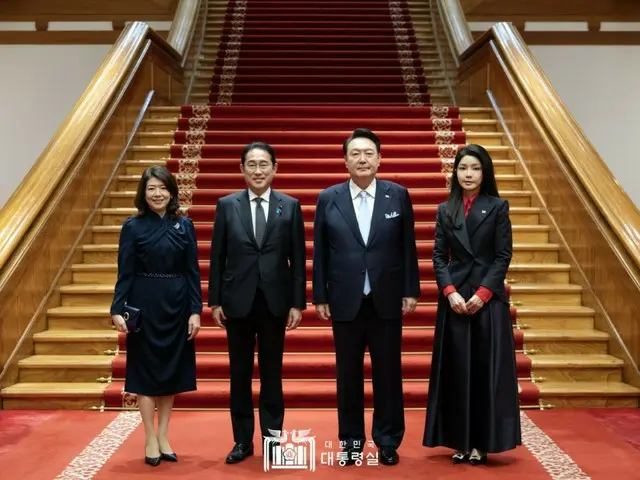They also agreed to begin considering ways to facilitate immigration procedures for both sides. Prime Minister Kishida is set to step down soon, and some civic groups in South Korea have voiced opposition to the meeting.
According to the South Korean newspaper Hankyoreh, Park Seo-geun, co-chairman of the Korea-Japan Historical Peace Action, said, "Is it sensible to invite a prime minister who is at the end of his term to hold a summit? It's a waste of public funds for a 'graduation field trip.'"
Even after the meeting, the opposition party and media critical of the Yoon administration have criticized the holding of the meeting. Japan-South Korea relations, which have been called the "worst since the war," are expected to worsen with the inauguration of President Yoon in May 2022.
In March of last year, the Yoon administration announced a solution to the former forced labor lawsuit issue, which was the biggest issue between Japan and South Korea. This prompted Prime Minister Kishida to focus on rebuilding relations, and in March of last year, the leaders of Japan and South Korea
Mutual visits between the two countries, known as "shuttle diplomacy," have resumed for the first time in about 12 years. Japan-Korea relations have improved dramatically, and now exchanges between the two countries are active not only in the political world, but also in the fields of business, sports, and between the private sector.
This was the 12th time that Prime Minister Kishida met with President Yoon, and his first visit to South Korea as part of shuttle diplomacy since May last year. The meeting lasted for about an hour. President Yoon said, "We will work together to improve the economy and security."
"All of the consultation bodies between the two governments have been re-formed in various areas, including the defense and defense industry," he said, emphasizing that "it is important to continue this positive momentum."
"There are still many issues to be resolved," he said, adding, "I hope that both sides will work together in a positive manner so that we can continue to move forward toward an even brighter future."
He pointed out that 2020 will mark the 60th anniversary of the normalization of diplomatic relations between Japan and South Korea, and emphasized that by joining forces, the two countries can "create a turning point that will allow the relationship between the two countries to take a further leap forward." In response, Prime Minister Kishida said, "
"Although there is a lot of history and history between our two countries, it is extremely important that we cooperate with South Korea for the future," he said.
They also confirmed that they will work together on a broad range of issues to ensure peace and stability in the region, including on the Korean Peninsula, as well as among Japan, the United States and South Korea.
The aim of streamlining procedures is to introduce a "pre-clearance" system in each country, whereby tourists visiting both countries would undergo immigration screening in advance at their departure points.
Prime Minister Kishida will step down after this month's LDP presidential election. His final visit to South Korea as prime minister aims to improve the environment so that the next administration can continue the good Japan-South Korea relationship.
According to Japanese media, citing a Japanese government official, the visit was initially planned to be a one-day trip, but the prime minister insisted on a two-day trip.
At a dinner held at the main building of the Presidential Palace, he called on Prime Minister Kishida to continue to lend his support to the development of Japan-Korea relations. Prime Minister Kishida cited the proverb "rain makes the earth firm" and said, "Japan-Korea relations will continue to improve."
"There have been times in the past when it rained heavily, but President Yoon and I have been working together to forge a path soaked with rain, and this has been a new beginning for Japan-Korea relations," he said.
After the talks, he told reporters, "The importance of Japan-Korea relations will not change in the slightest. I will continue to do my best in any capacity."
Following this meeting, ruling party People Power Party spokesman Song Young-hoon released a commentary on the 7th.
"I hope that even if the leader changes, the Korea-Japan relationship will develop further," said Roh Jong-myung, floor leader of the main opposition Democratic Party of Korea. "The summit was held to mark the retirement of Prime Minister Kishida.
The party has long criticized the Yoon administration's policy toward Japan as "humiliating diplomacy," and Roh, the floor leader, said, "What will our people gain from this kind of humiliating diplomacy? What has the Yoon administration gained?
The only things that have been praised by Japan and the bromance (close relationship between men) between Prime Minister Kishida and President Yoon are the praise from Japan. In addition, the Hankyoreh, which is known for its critical tone towards the Yoon administration, published an editorial on the 7th stating that President Yoon is
In light of the fact that the South Korean government will be building a relationship with the new Japanese prime minister in the future, he said, "The South Korean government must give up on the unreasonable 'speed war' and think about sustainable relations between the two countries.
"The relationship is nothing more than a castle built on sand."
2024/09/09 16:11 KST
Copyrights(C)wowkorea.jp 5

